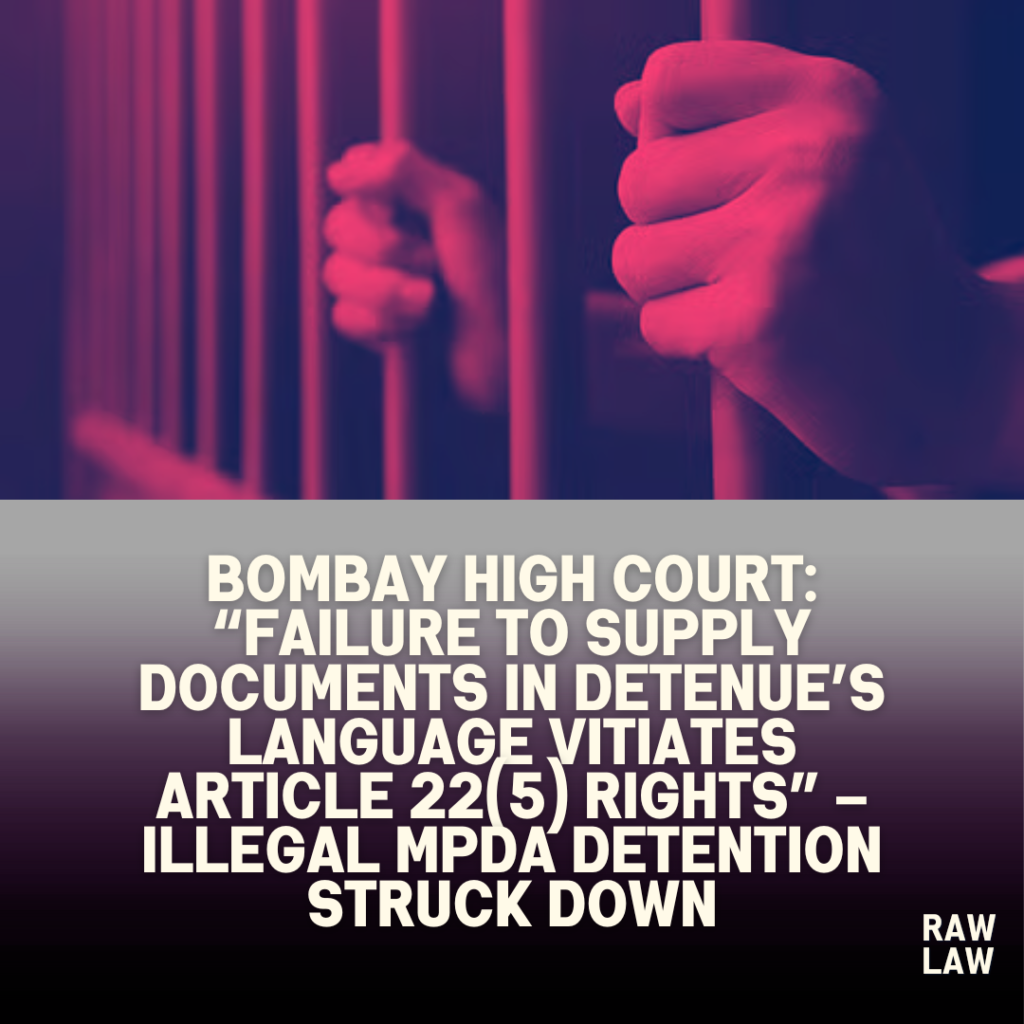Court’s Decision
The Division Bench of the Bombay High Court (Aurangabad Bench) comprising Justices Vibha Kankanwadi and Hiten S. Venegavkar quashed a preventive detention order passed under the Maharashtra Prevention of Dangerous Activities Act, 1981 (MPDA) against a 20-year-old detenue. The Court held that the detention order suffered from multiple incurable defects, including reliance on extraneous material, unexplained delay of nearly a year in execution, and failure to supply documents in Marathi. Declaring the detention as an abuse of power, the Court ordered the petitioner’s immediate release and directed the State to pay ₹2 lakh compensation, recoverable from the salary of the detaining authority.
Facts
- The petitioner was detained under order dated 18.07.2024 by the District Magistrate, Jalgaon, under the MPDA Act.
- On the date of the detention order, the petitioner was already in judicial custody in C.R. No. 140/2024, registered with MIDC Police Station, Jalgaon.
- The order, though passed in July 2024, was served only after his release on bail in May 2025, almost 11 months later.
- Grounds of detention cited two cases: C.R. No. 140/2024 and C.R. No. 127/2023, along with vague in-camera statements.
- The petitioner challenged the detention as arbitrary, relying on violation of Articles 21 and 22 of the Constitution.
Issues
- Whether preventive detention can be justified when there is long and unexplained delay in execution of the detention order.
- Whether reliance on an offence unconnected to the detenue (C.R. No.127/2023) vitiates subjective satisfaction.
- Whether failure to supply documents in Marathi to a detenue educated in Marathi violates Article 22(5).
- Whether vague in-camera statements regarding law-and-order breaches amount to disturbance of “public order.”
Petitioner’s Arguments
- Detention order was illegal since it was served nearly a year after being passed, snapping the live link between alleged activities and detention.
- Reliance on C.R. No.127/2023 was fatal, as the petitioner was not connected to that case; calling it a “typographical mistake” could not cure non-application of mind.
- In-camera statements were vague and related only to law-and-order breaches, not “public order.”
- Crucial documents were supplied only in English, though the petitioner understood only Marathi, violating Article 22(5).
Respondent’s Arguments
- Preventive detention can be passed even against a person in custody, provided authority is aware and satisfied of likelihood of release and resumption of prejudicial activities.
- Delay in serving the order was explained by the requirement under Section 13 MPDA that detention period runs from the date of actual detention.
- Reference to C.R. No.127/2023 was an inadvertent typographical error; substantive reliance was only on C.R. No.140/2024.
- In-camera statements showed criminal antecedents and justified preventive action.
Analysis of the Law
- Preventive Detention Principles: Citing Haradhan Saha v. State of W.B. (1975) 3 SCC 198 and Kamarunnissa v. Union of India (1991) 1 SCC 128, the Court reiterated that detention during custody is permissible only if release is imminent and prejudicial activities probable. No such satisfaction was recorded here.
- Delay in Execution: Following T.A. Abdul Rahman v. State of Kerala (1989) 4 SCC 741 and Rajinder Arora v. Union of India (2006) 4 SCC 796, the unexplained delay of nearly one year in execution snapped the nexus between alleged acts and detention.
- Reliance on Extraneous Case: Considering Khudiram Das v. State of W.B. (1975) 2 SCC 81 and Ashadevi v. K. Shivraj (1979) 1 SCC 222, reliance on C.R. No.127/2023 (with which petitioner had no connection) vitiated subjective satisfaction.
- Law and Order vs. Public Order: As per Dr. Ram Manohar Lohia v. State of Bihar (1966 SC 740), mere breach of law and order is insufficient to invoke preventive detention. The in-camera statements only showed isolated law-and-order issues, not disturbance of public order.
- Language Requirement: Applying Lallubhai Jogibhai Patel v. Union of India (1981) 2 SCC 427 and Powanammal v. State of T.N. (1999) 2 SCC 413, failure to supply translated documents violated Article 22(5) and denied the detenue effective representation.
Court’s Reasoning
- “Keeping the detention order pending for several months and serving it upon the petitioner at the moment of his release amounts to a colourable exercise of power.”
- Reliance on an unrelated crime (C.R. 127/2023) and casual explanation as a “typographical error” showed non-application of mind.
- Failure to supply Marathi translations of crucial documents vitiated the petitioner’s right to effective representation.
- The Court held that the detention order was a clear abuse of the extraordinary preventive detention power.
Conclusion
- Detention order dated 18.07.2024, approval dated 19.07.2025, and confirmation dated 15.07.2025 were quashed.
- Petitioner directed to be released forthwith, if not required in any other case.
- State ordered to pay ₹2,00,000 compensation, to be recovered from the salary of the District Magistrate who passed the illegal order.
Implications
- Reinforces that preventive detention is an exceptional measure and cannot be misused to circumvent regular criminal law.
- Clarifies distinction between law and order and public order in preventive detention jurisprudence.
- Establishes accountability of detaining authorities — compensation personally recoverable from officials passing illegal orders.
- Affirms constitutional protections under Articles 21 and 22(5) against arbitrary executive action.



